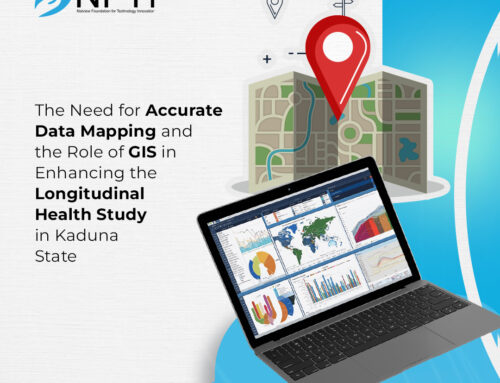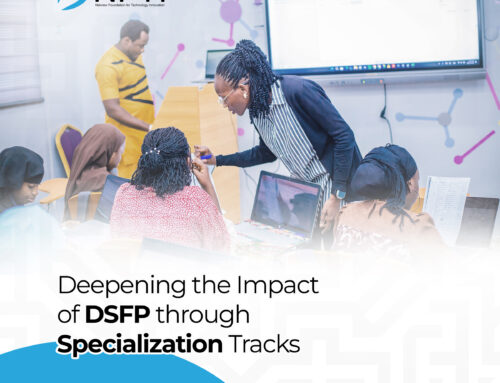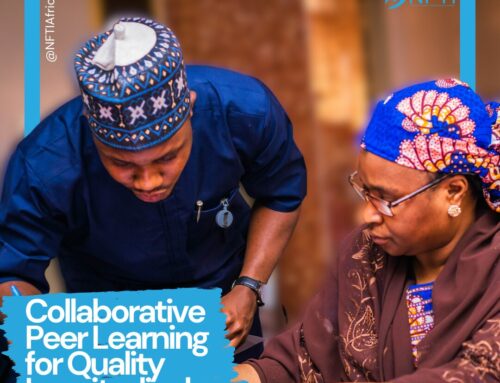Beginning in 2018, a groundbreaking partnership was formed among the Kaduna State Bureau of Statistics, the Bill and Melinda Gates Foundation, and the Natview Foundation for Technology Innovation (NFTI). Our shared vision to harness the power of data to drive effective decision-making has placed us at the forefront of innovative change in Kaduna State. One of the prime initiatives developed as part of the Kaduna State Data Master Plan is the Click-On Kaduna Data Science Fellowship Programme (DSFP) under the Amina J. Mohammed Data Lab Project. The programme illustrates our commitment to nurturing a data-centric culture in Kaduna state. This article shines a spotlight on the fellowship’s transformative influence on Kaduna State’s healthcare sector, emphasizing the programme’s pivotal role in paving the way for a data-driven sub-national government.
The Data Science Fellowship Programme focuses on empowering young Kaduna State residents with the most sought-after data science competencies. The six-month intensive training, which blends immersive classroom learning with practical field activities, lays a solid foundation in contemporary analytical techniques and data science methodologies.
The DSFP is special! Why you may ask? The unique strength of the Data Science Fellowship Programme lies in its practical application of data science principles. Our fellows do not just work with hypothetical data sets; they engage with real, impactful data. This means that they have the opportunity to analyze data sets that can yield insights capable of creating enduring social improvements in the lives of individuals and communities.
This hands-on, practical approach resonates with the Natview Foundation’s guiding mantra: “Data for Social Good”. It reinforces the Foundation’s belief that data, when harnessed appropriately, can become a powerful tool for driving societal change. By empowering fellows to work with real data that can catalyze social good, the DSFP perfectly embodies the spirit of the Natview Foundation’s mission.
The Fellowship Programme holds a prestigious reputation for a multitude of reasons. At its core, it is a forward-thinking initiative that combines rigorous training with practical applications in data science, a field that is shaping the future of industries and public services worldwide. Here are major reasons why the programme is prestigious:
- Collaborative Partnerships: The DSFP is the result of an alliance among the Kaduna State Bureau of Statistics, the Bill and Melinda Gates Foundation, and the Natview Foundation for Technology Innovation (NFTI). The backing of these distinguished organizations and other partners in the tech community enhances the prestige of the programme.
- Impactful Work: DSFP fellows work on high-stakes projects that have a direct impact on the lives of people in Kaduna State. Their contributions to projects in the health sector, and more are making a tangible difference, further elevating the programme’s status.
- Rigorous Training: The DSFP provides an intensive, comprehensive training regime that equips fellows with cutting-edge data science skills. This rigorous training, along with hands-on experience, places the fellows at the forefront of their field.
- Soft Skills Training: Further solidifying the DSFP’s prestige is the programme’s holistic approach to skill development. While the core of the programme centres around hard data science skills, the DSFP also recognizes the essential role that soft skills play in professional success. To this end, the DSFP includes soft skills training in its curriculum, providing fellows with essential competencies like communication, leadership, problem-solving, teamwork, and emotional intelligence. This comprehensive training approach ensures that the fellows can effectively present their data-driven insights, collaborate efficiently with diverse teams, and adapt to the dynamic challenges in the field of data science. The inclusion of soft skills training underscores the DSFP’s commitment to developing well-rounded professionals who can not only navigate the technical aspects of data science, but can also thrive in collaborative, multifaceted work environments. This multifaceted approach to training significantly contributes to the prestige and uniqueness of the Data Science Fellowship Programme, further setting it apart as a leading programme in the field.
- The Selection Process: The selection process for the DSFP is highly competitive, with only the most promising candidates being chosen. This level of selectivity ensures that the programme is comprised of high-caliber individuals. The Fellowship Programme also sets itself apart by demonstrating a strong commitment to gender inclusiveness in its selection process. Recognizing that diversity is a driver of innovation and performance, the programme actively encourages applications from candidates of both genders, especially young women. The DSFP understands that the field of data science, like many STEM fields, has historically seen an underrepresentation of women. To challenge this status quo and foster digital gender inclusion, the DSFP is consciously working to attract a more pool of female applicants. By promoting an inclusive environment, the programme aims to harness the full range of talents available, enhancing the richness of ideas, solutions, and approaches within the programme.
- Real-world Experience: Unlike many programmes, the DSFP provides real-world experience. Fellows work with actual data and contribute to live projects with the Kaduna State Bureau of Statistics, the Kaduna State Primary Healthcare Board, the Kaduna State Contributory Health Management Authority, and others, gaining invaluable, practical experience.
- Network Opportunities: DSFP fellows have the chance to interact and collaborate with key stakeholders and experts in the field of data science. These networking opportunities can open doors to future collaborations and career advancement.
- Opportunity to Earn While Learning: Adding to the prestige and appeal of the Data Science Fellowship Programme are the thoughtful provisions made for the fellows to support their journey throughout the programme. Every fellow enrolled in the DSFP receives a monthly stipend. This reflects the commitment of the program to remove potential barriers to participation and learning, reinforcing its dedication to nurturing the next generation of data scientists. In addition, given the online nature of much of the work and training in data science, DSFP provides fellows with a regular supply of internet data. This not only ensures uninterrupted access to our online resources and learning materials but also allows for seamless collaboration with fellow participants and instructors, irrespective of their location. By providing these resources, the DSFP demonstrates its commitment to an inclusive and comprehensive learning environment.
The prestige of the DSFP is rooted in its strong affiliations, its intensive and comprehensive training regime, and the real-world, impactful experience it offers to its fellows. This makes it not just a prestigious programme, but a transformative journey for the fellows involved.
The first two cohorts have concentrated on the critical healthcare sector, inviting participation from a wide array of backgrounds. Working closely with key organizations like the State Planning and Budget Commission, the Kaduna State Bureau of Statistics, and the Ministry of Health, DSFP fellows have been instrumental in shaping data workflows, developing pipelines, and enabling efficient health data modeling to support informed planning, policy tracking, and decision making.
The impressive achievements of the 70 fellows trained in the past two and a half years underscore the significant influence of data science in improving health outcomes in Kaduna State. NFTI and its partners under the strict supervision of our expert data scientists and quality assurance managers have involved the fellows in several impactful projects that further cement the importance of data-driven methodologies in the healthcare sector. Some of these projects include:
a. Integrated Supportive Supervision (ISS): DSFP fellows work under the supervision of the KDBS and NFTI to establish a unified digital ISS tool, optimizing the data collection process and enhancing error workflow management monthly and quarterly. Through the use of Power BI, the Data Analysts generated valuable insights from ISS data, empowering stakeholders to make data-driven decisions and increase healthcare system efficiency.
b. Harmonizing Health Facility Analytics Platform Data: The DSFP fellows have been involved in the crucial task of aligning the Health Facility Census data with the District Health Information System (DHIS2), a complex process involving fuzzy matching and ground-truthing. This comprehensive effort provides an integrated view of healthcare facilities’ data, thus supporting evidence-based decision-making.
c. Enhancing Health Data Reporting: DSFP fellows have worked with key stakeholders to improve the process of reporting health data on the DHIS2 platform, ensuring data accuracy and facilitating data visualization.
d. Supporting Data Cleaning and Verification: DSFP fellows have been given tasks that involve data cleaning, mapping, and verification process on the Health Facility Analytics Platform (HEFA), supporting better planning, performance evaluation, and policy implementation.
e. Collaborating on GIS Remote Sensing Projects: Some DSFP fellows have been actively participating in GIS remote sensing projects with the KDBS, analyzing data from satellite imagery, aerial photographs, and scanned maps to derive valuable insights.
f. Human Resource Platform for Health: NFTI spearheads the development of a robust Human Resource for Health platform in Kaduna state. Working in close collaboration with the Kaduna State Ministry of Health and NFTI, a couple of fellows are instrumental in shaping a system that aims to revolutionize human resource management within the health sector, with a specific focus on primary healthcare in Kaduna State. In another article, we will share how the Gates Foundation and NFTI are building a dynamic and efficient human resource platform that will play a pivotal role in streamlining the recruitment, training, payroll, and deployment processes of healthcare workers. This has significant implications for the effective delivery of primary healthcare services, which are the first point of contact for individuals, families, and communities in the healthcare system.
g. Promoting the Kaduna State Data Management Community of Practice: Under the guidance and supervision of the KDBS and NFTI team, DSFP fellows have taken ownership of the Kaduna State Data Management Community of Practise which is expected to play a crucial role in fostering a culture of continuous learning by organizing meet-ups to encourage knowledge exchange, collaboration, and the adoption of effective data management practices in the state.
The Data Science Fellowship Programme, in tandem with the Bureau and NFTI’s firm commitment, has been a driving force in ushering in a data-driven transformation in Kaduna State’s health sector. By fostering young talent and encouraging collaboration with key stakeholders, DSFP has played an integral role in facilitating evidence-based decision-making, refining planning strategies, and improving healthcare delivery. NFTI, spearheading the drive for social impact using data, and the DSFP programme, as a symbol of the transformative potential of data-centric approaches, continue to shape a promising future for Kaduna State’s health sector, leveraging data science for a healthier tomorrow.





